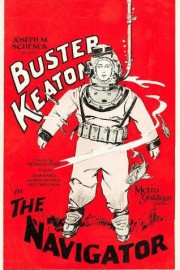The Navigator
One of the interesting things I’ve found is that, in going through Buster Keaton’s work over the years, very few of his feature films, at least, can be genuinely considered “great.” They’re entertaining, to be sure, and funny and inventive, but more often than not, they don’t elevate into the realm of great art. There are exceptions, of course, in “Sherlock Jr.” and “The General” and “Our Hospitality,” but comedy being the most subjective of film genres, I wouldn’t put many more of his films on that level. This is not to diminish the greatness of Keaton as a filmmaker, however, and he was great, and is, justly, one of my favorite filmmakers of all-time. It’s in the collective imagination and creativity of his work where his greatness lies, not whether every film achieves greatness individually. Not too many filmmakers can accomplish that.
“The Navigator” is top tier Keaton. A brisk 58 minutes, the film features simple, direct storytelling and comedy derived from character and situation that is some of Keaton’s strongest. The film starts off with Keaton’s character, a millionaire playboy who doesn’t offer much else besides money, being rejected in an impromptu marriage proposal by his beloved (Betsy, played by Katherine Maguire). Keaton’s character, Rollo Treadway, decides to go on his planned honeymoon anyway, but accidentally gets on the wrong ship. That ship, the SS Navigator, is owned by his beloved’s father, and is set out to see when spies from another country try to seize it. Rollo is not alone, however, as Betsy is on the ship, as well. Let the awkwardness begin.
Keaton was never like Chaplin in terms of the emotional content of his films- Chaplin was a natural storyteller, even if he played towards sentimentality more often than not. For Keaton, the story exists for the purpose of the set pieces he has in his head. But in his own way, Keaton was a natural storyteller, as well, in that his stories never veered off into logical fallacies or strayed from the heart of the story, which was usually Keaton’s character pursuing a goal, usually involving getting a girl. That sounds shallow, and it often was, but Keaton was boundless in his inventiveness with how the comedy unfolds, and “The Navigator” is no different. The ship offers Keaton plenty of opportunities to make us laugh, like when Betsy hangs a board with a man’s face outside of Rollo’s window, and Betsy, in a deck chair, almost slides off the ship as it rocks back and forth. And when the pair come upon an island of natives (whom the subtitles call, “cannibals”- typical early Hollywood stereotyping), the island people’s attempts to get on the ship and capture the pair, all as Rollo is also trying to fix and issue in the water, provides many instances of the “Keaton Curve,” with the action working its way back to the starting point while exploring comedic opportunities in between. The same could be said for their attempts in the kitchen- the first time, nothing seems to go right, while the second time, well, they’ve figured out a few things. The film is focused and funny. Most every Keaton film is, but this one is one of his most successful.










